|
|
|
Sort Order |
|
|
|
Items / Page
|
|
|
|
|
|
|
| Srl | Item |
| 1 |
ID:
181188
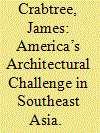

|
|
|
|
|
| Summary/Abstract |
US Vice President Kamala Harris and Secretary of Defense Lloyd J. Austin III have made significant official visits to Southeast Asia. Both sought to address concerns that the US had paid insufficient attention to the region during President Joe Biden's early months in office. But they left unanswered substantial questions about future US strategy as to both the Asia-Pacific as a whole and Southeast Asia in particular. This underlined doubts about Washington's ability to create and develop the kind of regional initiatives, institutions and partnerships that might help to blunt China's rise and draw nations in Southeast Asia back towards the US. To do so, the US will have to marshal deep focus and subtle statecraft to create new diplomatic architecture and set new standards for the region in areas such as trade and new technologies. Otherwise, American influence in the region is likely to decline.
|
|
|
|
|
|
|
|
|
|
|
|
|
|
|
|
| 2 |
ID:
187213
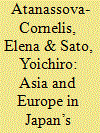

|
|
|
|
|
| Summary/Abstract |
This article examines Japan’s security alignments with key Asian and European partners, notably Australia, India, the UK, France and the EU itself. The articles explores Tokyo’s strategic expectations with regard to each of the five partnerships, as well as probing the likely future evolution of these alignments by providing a comparative perspective. Japan’s alignments with Australia and India conform with and supplement the US-Japan alliance, addressing Japan’s primary geostrategic concerns in the Asia-Pacific and the Indian Ocean region. Tokyo’s security partnerships with the European partners, and the EU, are more recent and not rooted in any US-led alliance in Asia. The degree of traditional kinetic military power these European players can bring to Asia is very limited. However, the pace with which Japan’s new European alignments are quickly moving beyond the non-traditional security areas to encompass more traditional defence and military-security fields attests to their potential of evolving in the future into mechanisms able to perform a broad range of security functions in response to complex security threats. The boundaries between these two categories of partnerships are likely to be further blurred, providing Japan with various mechanisms at different levels to shape and influence the regional and global security environment.
|
|
|
|
|
|
|
|
|
|
|
|
|
|
|
|
| 3 |
ID:
191824
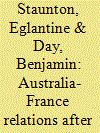

|
|
|
|
|
| Summary/Abstract |
The centrepiece of the AUKUS defence pact agreed between Australia, the United Kingdom, and the United States in September 2021 was a commitment to help Australia acquire nuclear-powered submarines. This made redundant an earlier $90 billion deal Australia had entered into with France to deliver conventionally powered submarines. Australia’s decision to renege on the French deal, as well as the revelation that three of France’s key partners had negotiated AUKUS in secret, triggered a furious French diplomatic response. In this commentary, we explore the ramifications of this episode for future Australia-France relations. We begin by documenting the immediate diplomatic fallout of the AUKUS announcement and tracing how the dispute became personalised between Australian Prime Minister Scott Morrison and French President Emmanuel Macron. We then move to consider how the episode reveals the divergent approaches Australia and France are taking in response to China’s growing influence in the Indo-Pacific. Finally, we highlight three reasons why this episode represents a theoretically valuable case study for scholars interested in the roles of trust and leadership in global politics, given it features the breakdown of interpersonal trust between leaders of friendly states.
|
|
|
|
|
|
|
|
|
|
|
|
|
|
|
|
| 4 |
ID:
191827


|
|
|
|
|
| Summary/Abstract |
The AUKUS agreement to facilitate Australia's acquisition of nuclear-powered submarines has been described by its critics as a ‘bet' on the U.S. This bet entails serious risks for Australia. These risks include uncertainty around construction of the submarines; uncertainty around the U.S.'s long-term commitment to the region; and uncertainty about the future political trajectory of the U.S. These risks are compounded by the sovereignty-constraining implications of AUKUS. The reliance on U.S. technical expertise, and the demands of military interoperability, will bind Australian defence policy more closely to the U.S. than ever. Hence, AUKUS is a deal that demands close scrutiny. This article contributes to such scrutiny, exploring the risks associated with this bet on the U.S. In particular, it examines the ‘America’ that Australian governments expressly want – a liberal internationalist America with a strong commitment to democracy – and then contrasts this with the America that Australia does not want but may well get: an illiberal America that is increasingly anti-democratic at home and crudely transactional, protectionist and undiplomatic abroad. The obvious problem with this approach, we argue, is that Australia does not get to choose the presidential administration in the U.S. over the next twenty to forty years.
|
|
|
|
|
|
|
|
|
|
|
|
|
|
|
|
| 5 |
ID:
192514
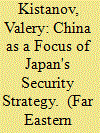

|
|
|
|
|
| Summary/Abstract |
This paper deals with Japan's current security policy toward China. Both countries have now become major trade and economic partners, but at the same time, their political ties have deteriorated significantly. Over the past decade, the degree of conflict in Japanese-Chinese relations has increased dramatically, despite consistent efforts by Tokyo and Beijing to improve bilateral ties through political and diplomatic measures. Japan is increasingly concerned about China's offensive naval activities in the East and South China Seas, which Tokyo regards as an area of vital interest. The most acute points of confrontation today are the situations around the Senkaku Islands and Taiwan, which could escalate into armed clashes. With the adoption of Tokyo's new National Security Strategy in December 2022, China has in effect been elevated to the main military threat to Japan. Under this strategy, Tokyo has embarked on a course of strengthening its military capabilities, paying particular attention to their offensive component. Moreover, in preparation for responding to the "Chinese threat," Japan is taking measures to qualitatively and quantitatively strengthen military cooperation with the US under a security treaty. The military alliance with the US will remain the cornerstone of Japan's security for the foreseeable future, including with the aim of deterring an increasingly powerful China.
|
|
|
|
|
|
|
|
|
|
|
|
|
|
|
|
| 6 |
ID:
181686
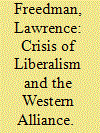

|
|
|
|
|
| Summary/Abstract |
Liberalism as the ideology of the Western alliance is in crisis. Having seen off Nazism and communism, it gained influence after the end of the Cold War, which produced optimism about security, human rights and global prosperity. Now liberalism, shaken by the financial crisis and the wars in Afghanistan and Iraq, is in retreat. Illiberal states, notably China and Russia, are reshaping the international system. Liberalism may not be able to continue to bind allies together, or enable them to cooperate effectively in a severe crisis. There are three counters to a gloomy prognosis, however. Firstly, heightened great-power competition has reinforced rather than undermined the alliance. Secondly, Russia and China have no substantial alliances, and are showing that authoritarian governments face serious problems of their own, including entrenched leaderships. Thirdly, liberalism remains better equipped to adapt to new circumstances.
|
|
|
|
|
|
|
|
|
|
|
|
|
|
|
|
| 7 |
ID:
181687
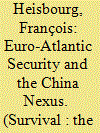

|
|
|
|
|
| Summary/Abstract |
As China has emerged over the past decade as a peer competitor of the United States, the bilateral relationship has become confrontational. Given the relatively wide range of possible strategic outcomes, Europe’s primary task is to organise itself for uncertainty. It must also assume that the US will react negatively if Europe is seen as running counter to America’s policy in the Indo-Pacific and build resilience into its policies to deal with sudden shifts in US policy. Europe’s overarching aims should be defending itself against a revisionist Russia, insulating Europe against direct Chinese coercion, helping like-minded countries prevent China from overwhelming the rules-based international order and avoiding a major war between nuclear powers. Despite the acrimony in the China–US relationship, the fear of nuclear annihilation that helped keep the Cold War cold is notably absent. Trust, especially among allies, is therefore paramount.
|
|
|
|
|
|
|
|
|
|
|
|
|
|
|
|
| 8 |
ID:
192083
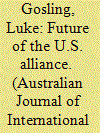

|
|
|
|
|
| Summary/Abstract |
One of the most successful defence pacts in history, Australia’s alliance with America is becoming ever more central to our strategic policy. This is a bipartisan trend that has been supported by previous governments, including in the Morrison government’s 2020 Defence Strategic Update, and is being implemented by the Albanese government, as confirmed in its 2023 Defence Strategic Review. At the same time, successive U.S. administrations have refocussed on the Indo-Pacific despite competing strategic priorities in other regions, including the Ukraine war. This has led to Australia and America pursuing a policy of deeper integration of their armed forces at the operational and strategic levels. This is most visible in northern Australia, whose value to Australian and allied defence planning is increasing for geopolitical reasons. Building on the Marine rotational force in Darwin announced in President Obama’s pivot to Asia, U.S. force posture initiatives are upgrading northern Australian defence infrastructure and deploying additional forces for exercises and contingency planning at a time when Australia is also investing in its northern bases. While cutting-edge capabilities such as SSN-AUKUS submarines will boost Australia’s strategic contribution to the alliance, its strength lies in the solid public support it enjoys.
|
|
|
|
|
|
|
|
|
|
|
|
|
|
|
|
| 9 |
ID:
188451
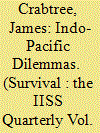

|
|
|
|
|
| Summary/Abstract |
The United States intends to manage China’s rise by forging a new balancing coalition of ‘like-minded’ partners and by developing deeper ties with other nations in the Indo-Pacific that view themselves as broadly non-aligned. Washington hopes that closer ties to the US and its partners will stop such countries from drifting towards China. But to create these deeper relationships, the non-aligned group also needs reassurance that attempts by the like-minded partners to integrate capabilities and fashion a new regional balance of power will not tip the Indo-Pacific towards conflict. Like-minded nations will need to appreciate the risks that security initiatives like the Quad and AUKUS are perceived to create, realise that Hanoi or Jakarta is unlikely to embrace Canberra’s or Tokyo’s vision of the region’s future warmly, and be willing to make substantial material investments. Tension between integration and reassurance will inevitably endure.
|
|
|
|
|
|
|
|
|
|
|
|
|
|
|
|
| 10 |
ID:
188505
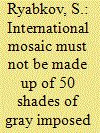

|
|
|
|
|
| Summary/Abstract |
Armen Oganesyan, Editor-in-Chief, International Affairs: Sergey Alekseyevich [Ryabkov], do you see in the near future a world split into two camps: the West vs. the non-West? It seems that world politics is moving toward a state of confrontation and a searching for partners for each center of power. In this regard, what model of international relations is Russia offering the world today?
|
|
|
|
|
|
|
|
|
|
|
|
|
|
|
|
| 11 |
ID:
187211
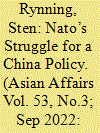

|
|
|
|
|
| Summary/Abstract |
NATO has promised to address China as “an alliance” but struggles to define underpinning principles. This article explores NATO's policy options and prospects. It traces the evolution of NATO China policy from 2017 on; assesses NATO's ability to pull China under its resiliency policy regime; and evaluates NATO's capacity to address wider issues of global order. The article concludes that NATO is not able to develop a politico-military strategy in line with classical alliance policy. Instead, NATO has pursued an incremental alignment policy to nourish its internal consensus and stave off the dire prospect of leadership abdication. Pushed by China's implicit support for the war in Ukraine, NATO must now become more politically explicit about China, global order, and NATO's approach to it.
|
|
|
|
|
|
|
|
|
|
|
|
|
|
|
|
| 12 |
ID:
184020
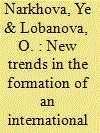

|
|
|
|
|
| Summary/Abstract |
THE HISTORY of international relations has seen many examples of nations that, on the verge of tectonic geopolitical shifts, followed a "bloc mentality" and sought to create alliances against third countries. Moscow, however, in accordance with its centuries-old traditions of diplomacy, has always acted contrary to such trends and preferred alliances aimed at development and ensuring peace and stability, refraining from interfering in the affairs of other sovereign countries or undermining their national foundations. In making that choice, Russia was guided not only and not so much by the nobility of its intentions, but primarily by the principles of realpolitik - namely, practical considerations of uniting as many countries as possible to effectively tackle common challenges and threats.
|
|
|
|
|
|
|
|
|
|
|
|
|
|
|
|
| 13 |
ID:
192594
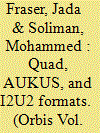

|
|
|
|
|
| Summary/Abstract |
Over the past two decades, a trend has emerged where US partners and allies look outside of their bilateral relationship with the United States and pre-existing multilateral bodies to join ad-hoc networks. They are joining these networks to both obtain their own security goods and to provide regional public goods. Yet, these ad-hoc networks, or “minilaterals,” often include multiple US allies or shared partners of the United States. For example, the revived Quadrilateral Security Dialogue (Quad) includes Japan, India, Australia, and the United States, encompassing two separate US treaty alliances. Similarly, the tripartite pact AUKUS connects the US-UK transatlantic alliance relationship to the US-Australia alliance in the Indo-Pacific. The newest addition to this growing trend in minilateralism, the I2U2, which redefine the Middle East as West Asia by bringing together the United States, India, Israel, and the United Arab Emirates (UAE), provides additional insight into the benefits of minilaterals as mechanisms for organizing interstate cooperation.
|
|
|
|
|
|
|
|
|
|
|
|
|
|
|
|
| 14 |
ID:
182301
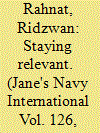

|
|
|
| 15 |
ID:
186993
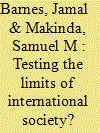

|
|
|
|
|
| Summary/Abstract |
When Australia reneged on a AUD$90 billion submarine contract with France in 2021 as it joined AUKUS, a new trilateral military partnership between Australia, the UK and the US, it was accused of lying and breaching France's trust. This perceived act of betrayal not only led to a deterioration in the diplomatic relationship between Australia and France, but it also drew attention to the consequences of violating the norm of pacta sunt servanda—agreements must be kept. Although it is recognized that breaches of trust undermine relationships, what has been underexplored is how a violation of norms can also undermine the presumption of trust in international society more broadly. Focusing on how Australia broke its contract with France after it joined AUKUS, this article argues that Australia's conduct not only harmed its relationship with France, but it also led the European Union (EU) to raise questions about how much to trust AUKUS partners as it engages in the Indo-Pacific region. It posits that adherence to international norms is important for developing trust between states in international society and has the potential to facilitate cooperation and enhance security in the complex Indo-Pacific region and beyond.
|
|
|
|
|
|
|
|
|
|
|
|
|
|
|
|
| 16 |
ID:
184028
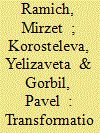

|
|
|
|
|
| Summary/Abstract |
This paper traces changes in US foreign policy approaches to the Indo-Pacific Region (IPR). Interestingly, even as US leaders changed their ways of restructuring the regional subsystem by establishing and maintaining ally relations with certain countries in the region, their objective remained unaltered - namely, security provision in the area with US leadership intact. At the moment, attainment of this goal is hindered by growing Chinese influence in the IPR. The authors focus on discovering criteria that would help assess the current situation in the region and the efficiency of the existing cooperation between the United States and IPR countries within organizations and agreements. The research was based on analyzing the modus operandi of regional players that are parties to agreements with the US and position themselves as US allies. The research criteria were as follows: participation in military exercises, deployment of military bases, defense agreements signed, data exchange in the area of military technologies, presence of nuclear weapons, lack of maritime territorial claims, and participation in navigation operations.
|
|
|
|
|
|
|
|
|
|
|
|
|
|
|
|
| 17 |
ID:
184987
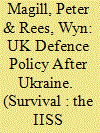

|
|
|
|
|
| Summary/Abstract |
The 2021 Integrated Review of Security, Defence, Development and Foreign Policy signified a major change in United Kingdom’s defence thinking because it identified China as the foremost threat to its long-term security interests. The resulting tilt to the Indo-Pacific region resurrected the prospect of a defence role that the UK had relinquished in the 1960s. Yet the UK can ill-afford to become a significant defence actor in the Indo-Pacific area. The optimal role for the UK is instead to encourage actors in the region to take the lead in countering China. The Russian invasion of Ukraine in February 2022 has reinforced the logic that the UK should concentrate its strength on bolstering the deterrent power of NATO within the Euro-Atlantic area.
|
|
|
|
|
|
|
|
|
|
|
|
|
|
|
|
| 18 |
ID:
187258
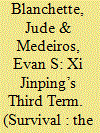

|
|
|
|
|
| Summary/Abstract |
During his first ten years in power, Chinese leader Xi Jinping has overseen substantial shifts in China’s political system and domestic economy, while also adopting a more activist and forceful foreign policy. With his likely third term beginning after the 20th Party Congress in October 2022, key questions remain about how his agenda will evolve. This article offers an assessment of Xi’s third term based on the key drivers and characteristics of Xi’s approach to domestic governance and foreign policy over the last two decades. It also explores how growing tensions and trade-offs will force policy shifts or otherwise constrain China’s growth. China seems likely to become more insular and self-referential, more frustrated and indignant and, ultimately, more alienated from the international community.
|
|
|
|
|
|
|
|
|
|
|
|
|
|
|
|
|
|
|
|
|